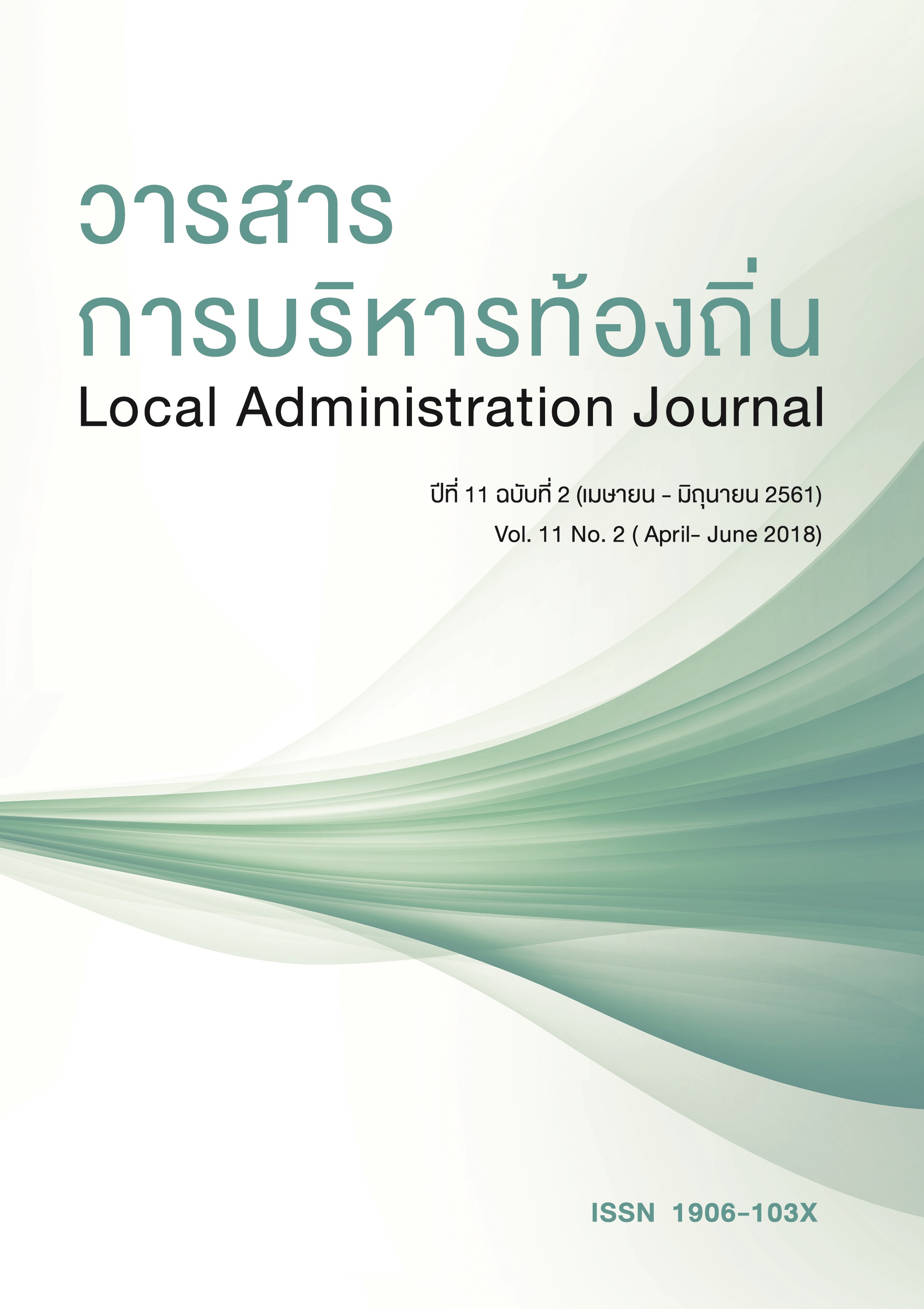Basic of Paradigms in The Development of Organizational Competencies for Local Administrative Organization at Special Economic Zones
Keywords:
Paradigms, Organizational Competencies, Special Economic ZonesAbstract
From the context of economic change both nationally and regionally. The result is a push for the development of special economic zones. Especially the border economic zone and from the problems of administration of local administrative organizations. It gives rise to the interest of the author to present basic of paradigms in the development of organizational competencies for local administrative organization at special economic zones. The organizational competencies model of local government organizations. What is the organizational structure? What are the key variables? That's the appropriate elements. In order to find the appropriate organizational competencies model for local administrative organization at special economic zones.
The author has presented basic of paradigms in the development of organizational competencies for local administrative organization at special economic zones. The literature review related to the organizational competencies model of local administrative organization to analyze similar features of the concept to be a basic paradigm in presented. The organizational competencies of the local administrative organization is appropriate for the local administrative organization at special economic zones. Four dimensions of the local administrative organization ,s organizational competencies including strategic managerial based competencies, resources-based competencies, performance-based competencies and transformation-based competencies.
References
2.พีรสิทธิ์ คำนวณศิลป์ และศุภวั ฒนากร วงศ์ ธนวสุ. (2546). รายงานวิจั ยเรื่องการพัฒนาศักยภาพการบริหารจัดการองค์การบริหารส่วนตำบลในภาคตะวันออกเฉียงเหนือ. ขอนแก่น :
โรงพิมพ์พระธรรมขันต์.
3.วิมล ปั้นคง. (2557). เขตเศรษฐกิจพิเศษพื้นที่ชายแดนกับการรองรับ AEC. สถาบันระหว่างประเทศเพื่อการค้าและการพัฒนา (ITD) ตีพิมพ์ : หนังสือพิมพ์โพสต์ทูเดย์Section : ธุรกิจ-ตลาด/ประชาคม
4.วิมล ปั้นคง. (2557). เขตเศรษฐกิจพิเศษบริเวณพื้นที่ชายแดนเพื่อรองรับ AEC (ออนไลน์). เข้าถึงได้จาก: http://www.itd.or.th/index.php [2560, 4 พฤษภาคม].
5.เสน่ห์ จุ้ ยโต. (2554). การพัฒนาขีดสมรรถนะบุคลากรขององค์กรปกครองส่วนท้องถิ่น . สำนักงานคณะกรรมการวิจัยแห่งชาติ.
6.สำนักงานคณะกรรมการพัฒนาการเศรษฐกิจและสังคมแห่งชาติ. (2558 ก). การพัฒนาเขตพัฒนาเศรษฐกิจพิเศษของไทย (ออนไลน์). เข้าถึงได้จาก: http://www nesdb.go.th [2558, 7
พฤษภาคม].
________. (2558 ข). เขตเศรษฐกิจพิเศษในประเทศไทย (ออนไลน์). เข้าถึงได้จาก: http://www.nesdb.go.th [2558, 7 พฤษภาคม].
7.Amit, Raphael and Schoemaker, Paul J. 1993. Strategic Assets and Organisational Rent.Strategic Management Journal. 14 (January): 33-46.
8.Escrig y Tena, Ana B. and Bou-Llusar, Juan C. 2005. A Model for Evaluating Organizational Competencies: An Application in the Context of a Quality Management Initiative. Decision Sciences. 36 (May): 221-257.
9.Hilderbrand, Mary E. and Grindle, Merilee S. 1994. Building Sustainable Capacity: Challenges for the Public Sector. Prepared Paper for the United Nations
Development Programme, Pilot Study of Capacity Building. Harvard University Harvard Institute for International Development. Retrieved July 14, 2006 from http://mirror.undp.org/magnet/cdrb/parti
10.Lado Augustine A.; Boyd Nancy G. and Wright, Peter. 1992. A Competency-Based Model of Sustainable Competitive Advantage: Toward a Conceptual Integration. Journal of Management. 18 (March): 77-91.
11.Zwanikken, Maria. 1995. Sierra Leone: December 1994 Public Sector Management Capacity Assessment & Decentralization Mission. In Handbook on Capacity
Assessment Methodologies: An Analytical Review. Thomas J. Hopkins,Consultant. Retrieved July 14, 2006 from http://mirror.undp.org/magnet/
cdrb/CAPMET
Published
How to Cite
Issue
Section
License
The copyright of all articles published in the Local Administration Journalis owned by the College of Local Administration, Khon Kaen University.



